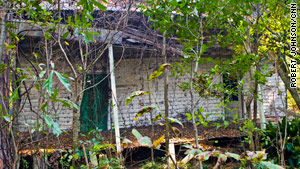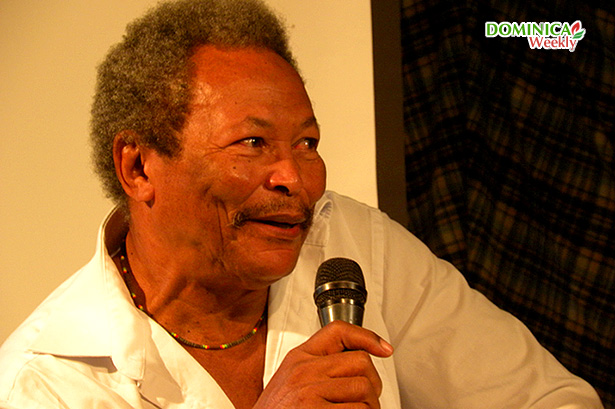Author Ernest Gaines comes home to where his ancestors were enslaved
November 9, 2010 2:59 p.m. ESTSTORY HIGHLIGHTS
- Author Ernest Gaines dedicates his time to Louisiana cemetery where loved ones are buried
- "We're honoring those people who never had anything," Gaines says
- University of Louisiana at Lafayette recently dedicated the Ernest J. Gaines Center
Oscar, Louisiana (CNN) -- A thick gray smoke shrouds the road. The asphalt turns into gravel, and rocks kick up beneath the car. Sugar cane fields stretch to the horizon.
The fields are being harvested and burned. A crumbled shack from the "quarters," once home to slaves, then sharecroppers, still stands amid overgrown trees and weeds.
This is home to some of the great characters of American literature, from books such as "The Autobiography of Miss Jane Pittman" and "A Gathering of Old Men." To author Ernest Gaines, it's his home and the home of "my early heroes" -- the aunt who raised him, his brothers, his neighbors, his friends.
"Without them, I would have nothing to write about," Gaines says. "This is my source of writing."
Sacred ground lies in the middle of the cane fields, a tranquil cemetery where five generations have been buried. About 80 vaults sit amid lush green grass. More people are buried here, in unmarked graves. Two giant pecan trees shade the grave sites. A third snapped in half during Hurricane Gustav; its trunk juts into the sky.
Gallery: Author Gaines at home with past
"This is the main job of my life now," says Gaines, 77. "I'm not writing too much any more, but this is my deepest concern now -- that I ensure the graves in the cemetery. To me, we're honoring those people who never had anything but this ... plot of land."
About 50 family members, friends and former students gather in Mount Zion River Lake Cemetery. Some descendants of the plantation are also on hand. They've come for the 13th annual cemetery beautification, held every October on the Saturday before All Saints' Day.
See photos of Gaines at home with the past
Flowers are planted, leaves raked. Some scrape vaults and give them a fresh coat of white paint. Prayers are uttered aloud and silently. One man, placing flowers on the graves of his mother, grandmother, grandfather and best friend, tells them, "''Preciate it."
Gaines and his wife, Dianne Saulney Gaines, saved the cemetery in the early 1990s. They formed a nonprofit organization, and 16 heirs of the plantation transferred ownership.
Back then, weeds as tall as the sugar cane covered the cemetery. Today it breathes of life, of pride, of dignity.
"I was afraid that eventually, if we didn't look after this place, they were going to plow it under," Ernest Gaines says.
When he's alone in the cemetery, he says, he feels close to the dead.
"I still remember the way they sang in the church," he says.
The author of "A Lesson Before Dying" plans to be buried here with his wife -- to be near those he loved most.
"I hope this place will be here forever," he says. "This is my prayer. This is my hope."
Chipping away at the 'myth'
Gaines sits in the library in his home, less than a mile from the cemetery. He picked cotton on the very spot where his home now stands when he was 8 years old.
A portrait of Russian poet Alexander Pushkin stares down from his library wall. The Rev. Martin Luther King Jr. looks on, too.
Gaines reads a passage from "A Lesson Before Dying." His deep, melodic voice bounces off the books on the shelves behind him.
I felt that if I wrote something that was good and wrote it well, it would outlive the 'Bull' Connors.
--Author Ernest Gaines"Do you know what a myth is, Jefferson?" Gaines reads. "A myth is an old lie that people believe in. White people believe that they're better than anyone else on earth -- and that's a myth. The last thing they ever want is to see a black man stand, and think, and show that common humanity that is in us all. It would destroy their myth. They would no longer have justification for having made us slaves and keeping us in the condition we are in. ..."
The author smiles. He is descended from the slaves who worked this land. Yet he's seen more success than the heirs of the plantation.
"Chip, chip, chip," he says. He's constantly chipped away.
"What I was trying to do was show that Kilroy was here," Gaines says, pointing toward the floor. "That I was here. My folks were here. My ancestors were here. This is how I tried to chip away at that myth -- by writing and writing well."
He's written more books than were in his home growing up. They had only a Bible and an almanac.
"I remember during the demonstrations here in the South in the '60s, how when 'Bull' Connor and his dogs and his hose pipes and his brutal deputies would go out and bash the heads -- I would promise myself: Today I must write a paragraph or a page better than I did yesterday. I must do it better because I felt that if I wrote something that was good and wrote it well, it would outlive the 'Bull' Connors," he says, referring to the infamous Birmingham, Alabama, official.
Gaines' life has come full circle. It is marked by two pivotal moves -- his escape from the South in 1948, and his return in January 1963, to complete his first major work.
This home still stands on the plantation. As a young boy, Ernest Gaines lived in a home similar to this with his aunt.His mother and stepfather had moved from Louisiana during World War II and settled in Vallejo, California. They left the young Gaines and his siblings to be raised by his aunt, Augusteen Jefferson, who was paralyzed from the waist down.
"Auntie," he calls her still.
"She used to crawl across the porch, down the steps and crawl over into the garden to work, because she had to put her hand in the Earth," he says. "Yet I never heard her complain a day. And I felt if she can do it, then there's no reason in the world why I should complain about anything."
Adds Rudolph P. Byrd, Gaines' biographer and a professor at Emory University: "She is a person who could not walk, but who taught him how to stand. And I think that says it all."
When Gaines left Louisiana to join his mother in Vallejo in 1948, he was 15. A pocket handkerchief and battered suitcase in hand, Gaines flagged down a Trailways bus to New Orleans, then caught a train to California. Both were segregated. "I was a country boy, never been anywhere."
He'd grown up impoverished -- "although I didn't know it" -- and lived in the old slave quarters. He left behind brothers, sisters, friends and his beloved aunt, to whom he's dedicated much of his work.
In California, unlike home, blacks were allowed in the public library. Gaines buried himself in books. "I read and read and read."
He quickly learned the library's collection had no books by black authors, and that stoked his interest in writing. The Louisiana he knew and the people he loved weren't represented.
"I wanted to be a writer. I wanted to say something about home."
His mother rented a typewriter and, at 16, Gaines wrote his first novel, "A Little Stream."
"He put it in a box and sent it off to a publisher in New York," says Byrd, the biographer. "The publisher responded and said, 'Thanks, but no thanks.' He went out and burned the manuscript. But he kept the story in his head."
By the early 1960s, he'd completed college, served two years in the Army and had won a writing fellowship at Stanford University. His contemporaries included the farmer, poet and novelist Wendell Berry and Ken Kesey, best known for "One Flew Over the Cuckoo's Nest."
Many friends were traveling the world, trying to become "great artists." Gaines was headed to Mexico in the summer of 1962 when fate intervened. He told his friends he needed to stay in the States a bit longer, to write.
I had to see and feel and be with the thing that I wanted to write about.
--Ernest GainesThat fall, while in California, he watched James Meredith become the first African-American to enroll at the University of Mississippi, to the ire of whites, "not knowing whether he would be killed or not."
"I realized then with all the trouble he had to put up with," Gaines says, "I must go to Louisiana if I'm going to write my novel. I had to see and feel and be with the thing that I wanted to write about."
He arrived in Baton Rouge on January 5, 1963. He finished within six months. That novel was a revised version of the book he had burned as a teen, renamed "Catherine Carmier."
One book begat another, which begat another -- six novels, a collection of short stories, a children's book and a collection of lectures.
The Ernest J. Gaines Center at the University of Louisiana at Lafayette, dedicated on October 31, will house his permanent collection and foster research and scholarship opportunities in his honor.
"Mr. Gaines has always felt that his fiction as art would be a means to bring about, not only an understanding of the human condition, but it would be a way of facilitating a very important dialogue between blacks and whites of the South," Byrd says.
Critics have accused Gaines of not being "militant enough" in his writing. He says he was "screaming inside," letting his words on paper speak for him in effecting change.
'Home is here'
The acclaimed author could live anywhere in the world. Six years ago, he and his wife moved into their current home, on six acres of the old plantation.
Gaines has moved the church where he was schooled to his property. His grandfather helped build it."San Francisco and Vallejo was never home. It was a place to be educated and to spend the rest of my life, but it wasn't home. Home is here," he says.
Out back is the church where Gaines attended services and was schooled for six years. Black children could only attend for five months out of the year, because of the planting and harvesting seasons. There were no desks, just pews. "Sometimes, you'd sit on your knees and use the bench as a desk."
His grandfather helped build the church, and Gaines and his wife moved it from near the slaves' quarters.
The author walks slowly, with the aid of a walker because of a fall down a flight of stairs in 1983. His face lights up inside the church. "I hear the voices and the songs and the stories of the old people," he says.
On the walls are photographs of the plantation taken in 1968. Some are of the people immortalized in his books. And some now lie in the cemetery, surrounded by sugar cane.
Gaines and his wife will keep cleaning it, and hope the next generations will do the same.
"We have dignity," Dianne Gaines says, "because of the independence our families taught us in spite of poverty. ... We had the things that mattered. We had love. We had strong families, and we had families around us that embraced us. And from that, we had dignity."
Gaines was too poor to make the trip to attend his aunt's funeral in 1953. He's not sure exactly where she is buried but says he believes it's somewhere near the spot he and his wife have chosen for themselves.
Why would someone return to the place where his ancestors were enslaved?
It's a question Gaines is often asked, and he has a ready answer.
"That didn't draw me back here," he says. "I came back here because this is where I was born and raised. And Auntie was here. Auntie was here! ... When I die, I want to be somewhere near where she was."
CNN's Robert Johnson and Ken Tillis contributed to this report.





















